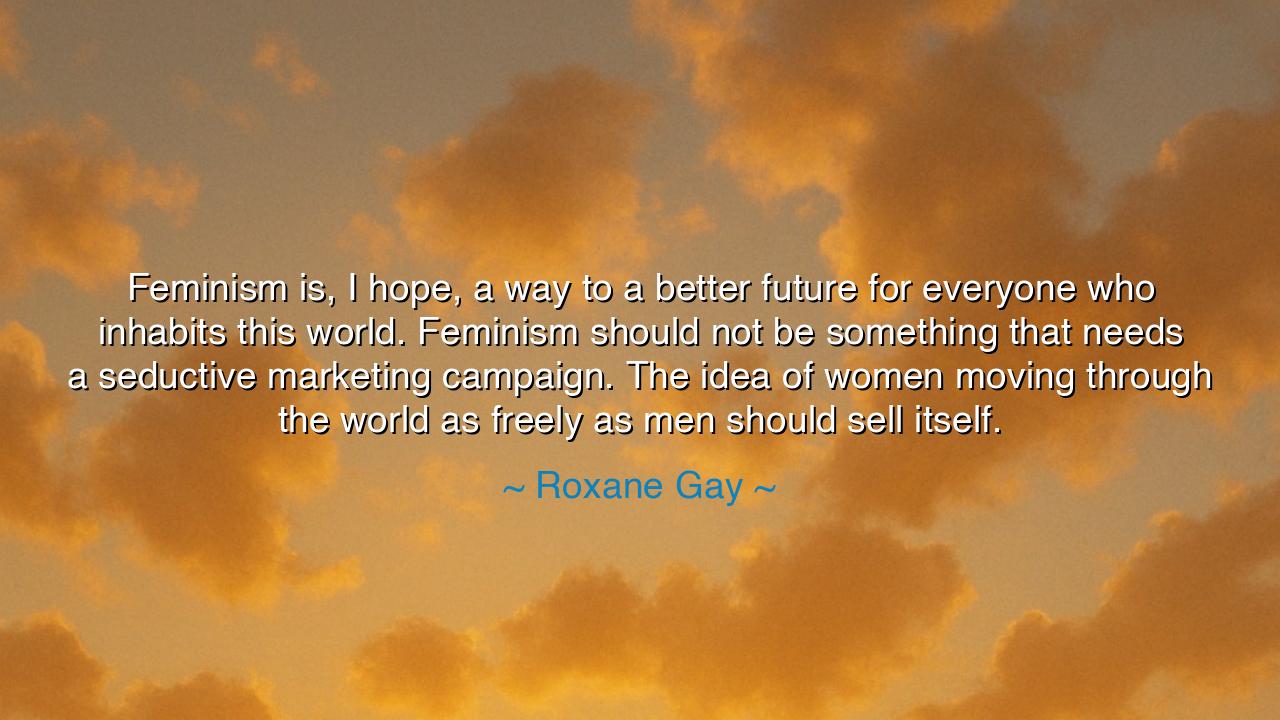
Feminism is, I hope, a way to a better future for everyone who
Feminism is, I hope, a way to a better future for everyone who inhabits this world. Feminism should not be something that needs a seductive marketing campaign. The idea of women moving through the world as freely as men should sell itself.






On Equality, Freedom, and the Unadorned Truth of Justice
When Roxane Gay declared, “Feminism is, I hope, a way to a better future for everyone who inhabits this world. Feminism should not be something that needs a seductive marketing campaign. The idea of women moving through the world as freely as men should sell itself,” she spoke with the fire of one who sees clearly through the illusions of her age. Her words ring with the wisdom of the ancients — for she reminds us that truth, when pure, needs no ornament. Equality, like sunlight, is self-evident; it shines for all, without persuasion or disguise. The tragedy, then, is not that the truth is unclear, but that humanity has learned to avert its gaze.
To Roxane Gay, feminism is not a slogan, nor a trend, nor a weapon of division. It is a path — a way to a better future, not for women alone, but for the entire world. She speaks not of conquest, but of balance; not of supremacy, but of liberation. Her vision is not one where power shifts from one hand to another, but where every soul, regardless of gender, may walk freely, unburdened by prejudice or fear. The idea of women moving through the world as freely as men, she says, should “sell itself” — for how can anyone of conscience deny the simple justice of such a vision? And yet, history shows us that what should be obvious often requires the courage of centuries to be seen.
The origin of this struggle reaches deep into the roots of civilization. For millennia, societies across the earth have bound women in invisible chains — of expectation, silence, and subservience. Their voices were confined to the margins, their worth measured by the shadows they cast behind men. Yet, through every age, there rose those who dared to defy that order — from Hypatia of Alexandria, the philosopher slain for her intellect, to Mary Wollstonecraft, who first declared that women’s rights were human rights; from Sojourner Truth, who cried “Ain’t I a woman?” to Malala Yousafzai, who faced the gun for the right to learn. Each carried the same torch: that the dignity of one gender is inseparable from the dignity of all.
Roxane Gay, in her words, gives this ancient struggle a modern voice. She calls out the absurdity that feminism must be “marketed,” as though justice were a product to be sold. Her lament is not only for women, but for humanity itself — for when the obvious must be advertised, the soul of society is ill. The truth she speaks is not fashionable; it is foundational. If a world where women move freely must be sold to people, it is not progress we lack, but vision. Her statement is a reminder that freedom, once defined as universal, cannot be selective — it must encompass every life that breathes beneath the same sky.
Consider the example of Emmeline Pankhurst, the suffragette who stood before jeering crowds and hostile courts, demanding the right to vote. Her cause, in her day, was dismissed as unnatural, even dangerous. Yet the freedom she sought was not radical — it was rational. The right to self-determination is not a favor to be granted, but a truth to be recognized. When history looks back, it does not praise those who resisted equality; it venerates those who insisted upon it. And so, too, will the future remember Roxane Gay’s generation — not for its debates about branding feminism, but for whether it chose justice without adornment, without fear, and without delay.
The lesson in her words is both simple and profound: truth needs no costume. When a thing is just, it should not require persuasion; when a cause is righteous, it should not need to be made “cool.” The freedom of women — to walk unafraid, to speak unshamed, to dream unbounded — should not be revolutionary, but ordinary. And yet, until it becomes so, every person who recognizes its necessity must labor as though carrying a sacred duty. To live as feminists, in Gay’s sense, is not merely to hold an opinion, but to embody an ethic — to act daily in defense of fairness, compassion, and the full humanity of others.
The actions she calls us toward are not grandiose but immediate. Begin in your own heart: examine where bias still hides, where silence enables harm. Speak truth, even when it is inconvenient; share power, even when it costs you comfort. Support the education, safety, and dignity of women and girls — for in doing so, you are not advancing one half of the world, but the whole of it. Let every person, man or woman, become a witness to this shared struggle for equality.
Thus, in Roxane Gay’s words, we find not a plea but a prophecy — that one day, justice will need no defense, and equality will be as natural as breath. The idea that women may walk this earth as freely as men, she says, should “sell itself.” Indeed, it should — and when humanity learns to value truth not for its popularity but for its purity, that day will have come. For until all are free, none are truly free. And the light of feminism, once kindled, will guide us — not to victory over one another, but to harmony among us all.






AAdministratorAdministrator
Welcome, honored guests. Please leave a comment, we will respond soon